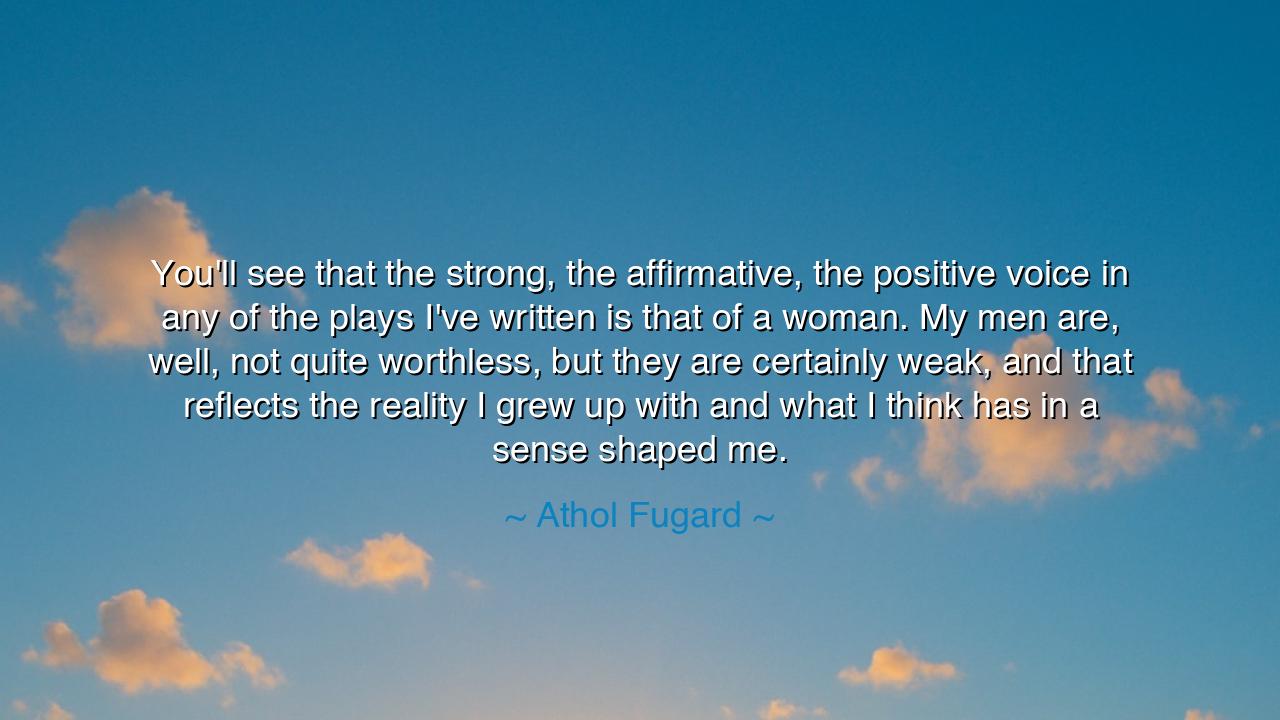
You'll see that the strong, the affirmative, the positive voice
You'll see that the strong, the affirmative, the positive voice in any of the plays I've written is that of a woman. My men are, well, not quite worthless, but they are certainly weak, and that reflects the reality I grew up with and what I think has in a sense shaped me.






Athol Fugard, chronicler of South Africa’s wounds and witness to its struggles, once declared: “You’ll see that the strong, the affirmative, the positive voice in any of the plays I’ve written is that of a woman. My men are, well, not quite worthless, but they are certainly weak, and that reflects the reality I grew up with and what I think has in a sense shaped me.” In these words lies both confession and reverence. Fugard reveals that in his world, it was women who carried strength, resilience, and the power to endure, while men faltered under weakness or despair. His art, then, became a mirror of the reality that raised him.
The essence of his wisdom is that strength often arises not in the expected places, but in those whom society underestimates. Fugard’s women embody courage, affirmation, and survival. They are the voices that sustain families, confront injustice, and keep alive the flame of hope. His men, by contrast, represent the frailty he witnessed, weighed down by hardship or stripped of moral authority. In giving women the role of the positive voice, Fugard both honors them and testifies to their true power in the life of a nation.
History offers many mirrors to this truth. Consider the life of Sojourner Truth, who, though born into slavery, spoke with unyielding force against oppression, her voice stronger than that of many men who wavered in the struggle. Or Winnie Mandela, who stood with fierce defiance during the long years when Nelson Mandela was imprisoned, carrying the torch of resistance in South Africa. Like Fugard’s heroines, these women embodied resilience, proving that the affirmative voice often belongs to those whom the world seeks to silence.
Fugard’s words also reflect the deeper truth that art grows from experience. What he saw in his childhood—the labor, sacrifice, and moral clarity of women—became the soil from which his plays emerged. He teaches us that the artist does not invent strength or weakness, but reflects it from life, shaping memory into drama so that generations may recognize themselves upon the stage. In this way, his confession is also a tribute to those women who shaped his very being.
Let this wisdom endure: true strength is not always the loudest or the most adorned, but the voice that persists, affirms, and sustains through trial. Fugard’s declaration reminds us that the positive voice of humanity has often been the voice of women, rising when men falter, enduring when nations tremble. And if art is the memory of a people, then his plays stand as monuments to that truth—that it is often women who, through quiet endurance and unyielding affirmation, shape the destiny of the world.






VNvuong Nguyen
This quote makes me think about the impact of Fugard’s personal history on his writing. The way he describes men as ‘weak’ could be interpreted as a critique of traditional masculinity or the lack of positive male role models in his life. But could there be an alternative interpretation? Could it be that his men represent the fragility of patriarchal systems, rather than an inherent weakness in men themselves?
MTMinh Thuy
Fugard's assertion that women are the strongest voices in his plays offers a powerful perspective on the representation of gender in theater. I wonder how much of this stems from his own experiences and how much is a commentary on broader societal issues. Do his works ultimately empower women, or is there a risk of presenting an unbalanced view of men and women’s roles in society?
DCvan dai ca
I find Fugard’s reflection on his upbringing really intriguing. He seems to be using his personal experiences to shape how he writes his characters. I wonder if his male characters’ weaknesses are a product of the society he grew up in, or if they reflect a larger critique of power structures. Does this kind of portrayal offer a more nuanced view of gender or lean too heavily into stereotypes?
TLtrung luong
This quote from Fugard makes me think about the way we view gender roles in literature. The idea that men are portrayed as weak and women as strong could be seen as empowering women in a field that has historically been dominated by male voices. But could there be a risk in overgeneralizing men’s weaknesses in this context? How do these character dynamics affect the audience's interpretation?
XNxiem nguyen
Fugard's statement highlights a fascinating aspect of character development in his works. I’m curious if his depiction of men as weak is a critique of masculinity or just a mirror to the real-world power dynamics he observed. Is he intentionally placing the stronger, more affirmative voices in women’s hands to make a statement about gender equality?